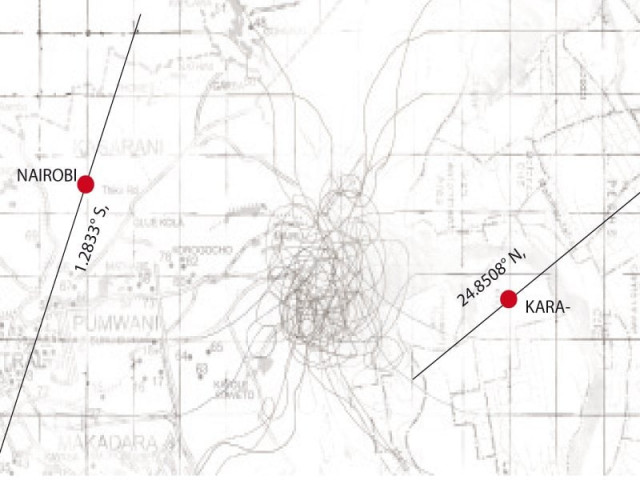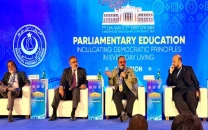Growing pains: Like Nairobi, will Karachi become its own master?
Kenya has just returned power to its urban hubs by creating counties but Pakistan still struggles.

Kenya has just returned power to its urban hubs by creating counties but Pakistan still struggles. DESIGN: ANUSHAY FURQAN
What do Nairobi and Karachi have in common - aside from the Aga Khan’s philanthropy and an Ismaili population? As it turns out, the Kenyan capital bears remarkable similarities to the financial capital of Pakistan. They share that label too as drivers of their country’s economies.
The name Nairobi came from the Maasai phrase ‘Ewaso Nai´beri’, meaning “a place of cool waters”. And Karachi’s original old city was marked by two gates - Kharadar and Mithadar - or the gate of brackish water and the sweet-water gate.
Both cities share a colonial past. Nairobi landed on the imperial map in 1896 as a European depot for caravan trade. It became the capital of all of British East Africa. Karachi expanded rapidly to become a centre for rail and sea trade as a consequence of British rule.
Today these cities may not share the same population - Nairobi is four million and Karachi 20 - but they struggle with the same demons. Aside from challenges such as a dire need for public transport, slum spread and police corruption, Karachi and Nairobi have embarked on a trajectory of experimentation in devolution by returning more power to local government. The difference is that Nairobi is getting it right and Karachi is lagging behind.
The year 2010 heralded in devolution for both Nairobi and Karachi. Kenya got a new constitution enshrining it and Pakistan the 18th Amendment that gave more power and rights to the provinces. Additionally, Sindh acquired in 2012 the new Sindh Peoples Local Government Ordinance 2012 (SPLGO). In it Karachi, Hyderabad, Mirpurkhas, Larkana and Sukkur are given the status of divisions with mayors heading the metropolitan corporations of all five divisions.

The changes in Nairobi included the creation of 47 counties. “[The system] has huge promise because it allows local people to make local decisions,” says Patrick Adolwa, who is leading a team that is preparing a national strategy for urban planning and development in Nairobi. “National governments cannot do [this] because of distance, vested interests.”
Adolwa recently spoke to The Express Tribune on the sidelines of a Municipal Arts Society of New York City meeting.
In Nairobi, as with Karachi, there was a tussle over control between the city and national governments. At Kenya’s independence in 1963, local governments were strong and managed many services. Karachi also started out with well-oiled municipal mechanisms thanks to the British. But in both cases they were reeled back by the central government. In Nairobi’s case it was a national government cascaded down to the provincial level. “Today all services have virtually gone back to the national government,” explains Adolwa.
None of the entire range of civic services - gas, sewers, water - is provided by the city government in Nairobi. “In many ways the municipalities are an empty shell,” says Adolwa. “It was hegemony of central government. Over the years, the national government has chipped away at the local municipalities to the extent that most of the services have been recentralised.” This has, however, changed with the new constitution and there is a clear demarcation of what the national government will do.
This is the part that Karachi has yet to get right. Its provincial and city governments control a patchwork of services instead of it all being under one umbrella. After decades of the British system, Musharraf brought in a new local government formula in 2001 but that wrapped up in 2009. Political parties at the helm fought for three years and then came up with the SPLGO but there is a stay order from the Supreme Court over implementing it. And so, as Nairobi adjusts to its new system, Karachi is stuck in limbo.
Paying for it all
With the new constitutional dispensation, Nairobi’s municipal strength has been revived in the shape of 47 counties. The only problem with devolution is that no one is sure how the counties will be able to pay for everything. Sound familiar? This was exactly the same debate Karachi had with Islamabad after the 18th Amendment gave the provincial government more responsibilities but not with keys to the coffers.

At the heart of this tug of war are taxes. Unfortunately, before independence, local governments in Kenya had a lot of leverage in this arena. But then the central government took back all the important taxes and left only what were called the nuisance taxes (vegetable vendors, hawkers) to the municipalities.
Now these powers have been returned, but partly. In the new arrangement, there are certain taxes that the counties will collect (property taxes, some licenses). The national government returns 15% as well. “But it is argued that this is mere tokenism,” says Patrick Adolwa, who is leading a team that is preparing a national strategy for urban planning and development in Nairobi.
Karachi too fights with the central and provincial government over how much it should get back in taxes given that it contributes roughly 20% of Pakistan’s economy. Devolution meant that staff was transferred from federally run institutions to provincial ones, but the ability to pay them did not accompany.
The city coffers are empty and it relies on the provincial government for handouts. For example, Karachi has a budget of Rs31.5 billion this year but half of it has to come from the provincial government. Its ability to tax is also severely limited as a result of which its income mostly comes from billboard advertisement taxes, charged parking, income from hospitals, the zoos, parks - but this is not enough. It was so short of cash recently that sanitation staff, who had not been paid for two months, let garbage pile up.
Published in The Express Tribune, January 16th, 2013.



















COMMENTS
Comments are moderated and generally will be posted if they are on-topic and not abusive.
For more information, please see our Comments FAQ